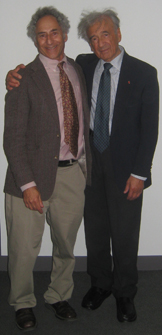| English Department 242 Goldwin Smith Cornell University Ithaca, New York 14853 USA |
Office phone: (607) 255-9313 |
Home Address: 925 Mitchell Street, #3 Ithaca, NY 14850 Phone: (607) 273-5735 |
I am the Frederic J. Whiton Professor of English and Stephen H. Weiss Presidential Fellow at Cornell University, where with great pleasure I have taught undergraduates and graduates since 1968. I am especially proud to have received in 1998 the Cornell Russell Distinguished Teaching Award and in 1999 the title of Stephen H. Weiss Presidential Fellow in recognition for Distinguished Teaching. My most recent book is How to Succeed in College and Beyond: The Art of Learning (Wiley, 2016). My prior one was Reading the European Novel to 1900: A Critical Study of Major Fiction from Cervantes's Don Quixote to Zola's Germinal (2014) The sequel, entitled Reading the European Novel from 1900 will include novels by Proust, Mann, Kafka, Camus, Bassani, di Lampedusa, Saramago, Muller, Kundera, Pamuk,and Kertesz. My personal interests include films, travel, theatre, art museums, tennis, swimming, exercise, and restaurants. I write regularly on the media and higher education for the Huffington Post and write on travel for a number of publications. All my Huffington Post pieces can be found here.
Celebrating Dan Schwarz: Fifty Years of Transformative Teaching
Conference in honor of my fifty years at Cornell. March 23 and March 24, 2018
See http://english.cornell.edu
http://english.cornell.edu/50-years-transformative-teaching-celebrating-dan-schwarz;
Holocaust Remembrance Talk
Dan Schwarz and Raoul Hoffman at a program commemorating the Holocaust
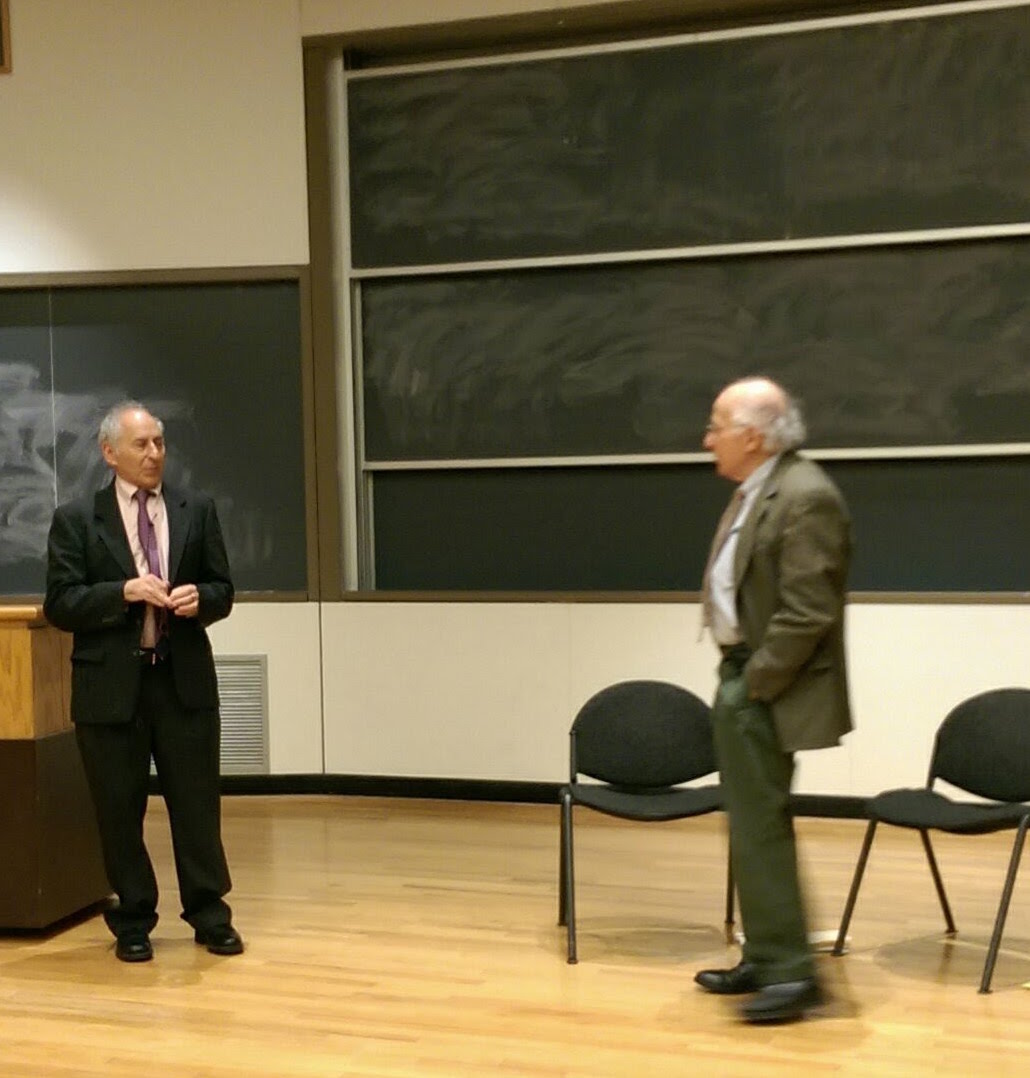
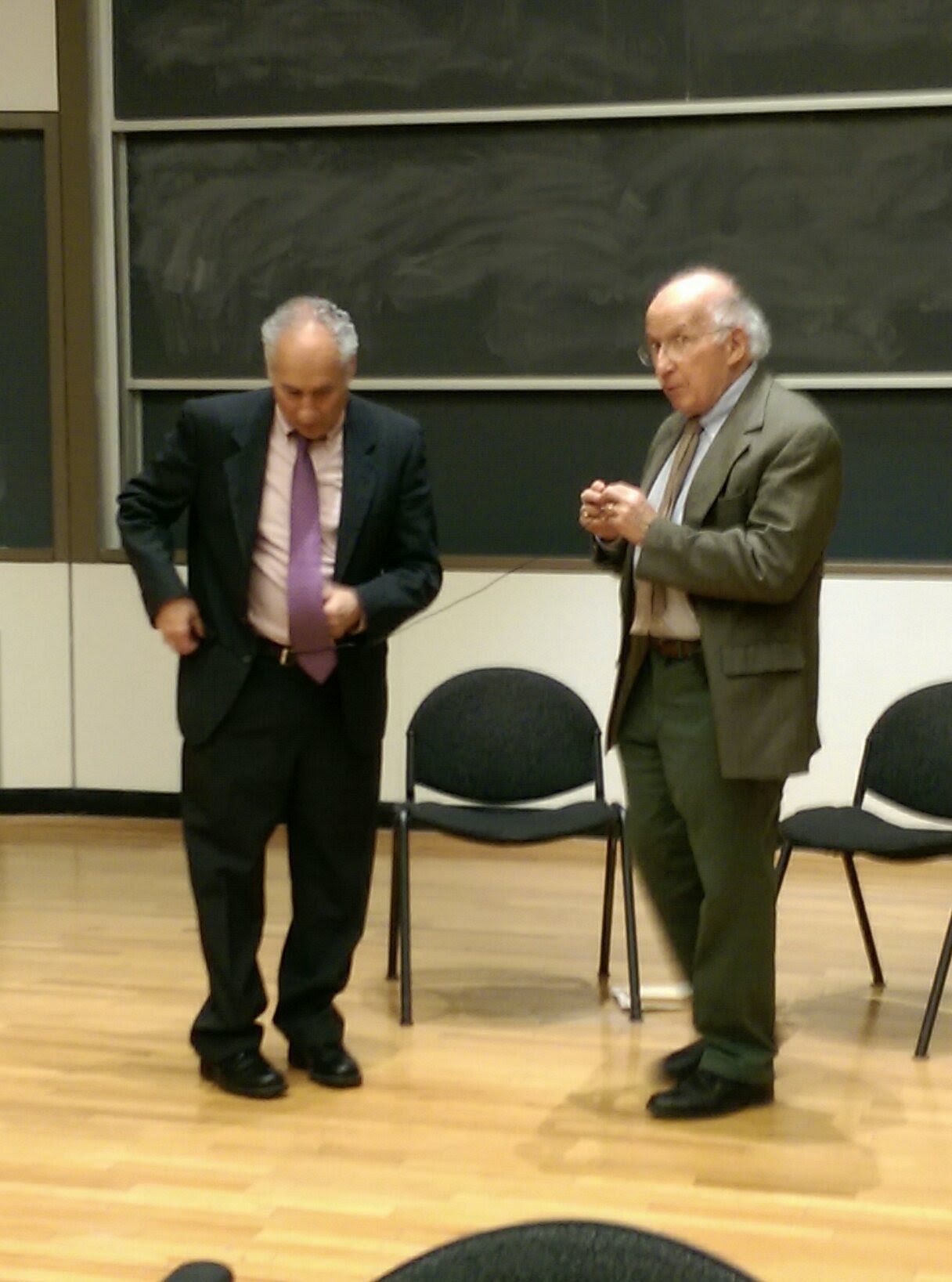
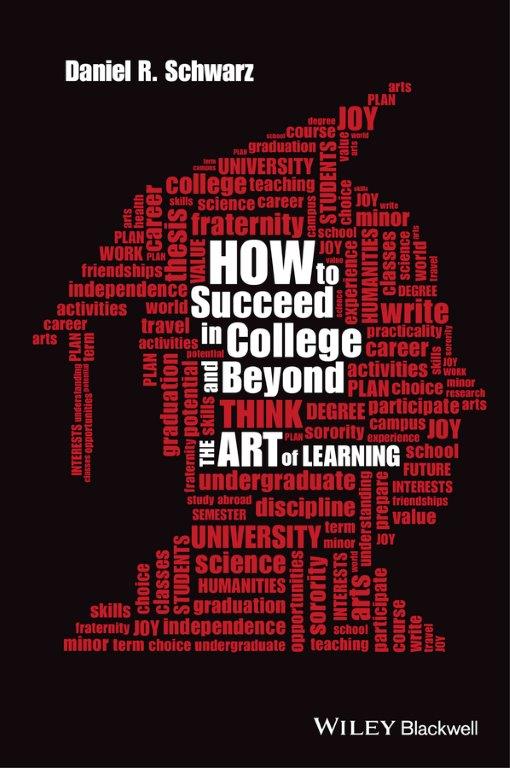
How to Succeed in College and Beyond: The Art of Learning
Description
“This should become required reading for current and prospective college students (and their parents) who want the inside scoop from a legendary professor on why college remains a wise investment, and a doorway to a fuller life. It offers practical, step-by-step advice on issues from finding a mentor, to student debt and rising tuition costs. Schwarz bolsters his wise commentary with testimonials from current and former students, as well as other professors and administrators.” Daniel Morris, Purdue University
How to Succeed in College and Beyond is an invaluable guide to the undergraduate experience that helps students balance the joy of learning with the necessity of career preparation.
This insightful and thoughtful book, written by an award-winning educator and mentor with almost 50 years of experience in the classroom, gives an impassioned argument for the importance and relevance of an arts and humanities education, but does not neglect the students who choose other fields, including social sciences and STEM (science, technology, engineering or math).
While featuring a wealth of advice for getting the most out of a college education, Schwarz takes prospective and current students, as well as parents, on the journey that begins with high school preparation, application, acceptance, and financial aid, through graduation and beyond. He offers specific advice for each undergraduate year in order to maximize the potential of the college experience. The book helps students navigate key issues, such as time management, course selection, extra-curricular activities, the Greek system, study abroad programs, junior year abroad, independent study and honors work, how to best use summers, strategies for getting excellent recommendations, graduate school preparation, career searches, and job interviews. It also offers suggestions for parents whose children are in college.
In a world that tends to place a greater value on more vocationally focused majors, Schwarz emphasizes the benefits of the arts and humanities and the importance of learning how to write effectively, speak articulately, and think critically - skills that allow students to succeed no matter what their career choice. Packed with information, this guide is an indispensable resource for prospective and present undergraduates and their parents, teachers, and advisors.
For enthusiastic readers' reviews and for ordering on Amazon, see http://www.amazon.com/How-Succeed-College-Beyond-Learning/dp/1118974840
See this article announcing my new book How to Succeed in College and Beyond: The Art of Learning, Huffington Post, March 1, 2016. http://www.huffingtonpost.com/daniel-r-schwarz/how-to-succeed-at-college_b_9354694.html
Check out this excellent review by ithaca.com: "The Dream of Success: Schwarz's new book aims at the college experience", April 1, 2016. http://www.ithaca.com/entertainment/the-dream-of-success-schwarz-s-new-book-aims-at/article_1e64afb8-f6a5-11e5-a33a-830be8cbd131.html
Another nice article about my new book: http://as.cornell.edu/news/schwarz-writes-new-book:
Listen to this interview with Greg Fry, WHCU, Ithaca, on my book, How to Succeed at College and Beyond: The Art of Learning, http://whcuradio.com/podcasts/audio-new-book-explores-college-before-during-after/, April 9,2016.
Listen to this interview with Pat Dayton, "Small Town Top College," on my book, How to Succeed at College and Beyond: The Art of Learning, http://smalltowntopcollege.com/sttc010/
An article about my book by the independent student-run college newspaper: http://cornellsun.com/2016/09/17/english-professor-advises-students-on-how-to-succeed-in-college/
An interview with David L. Marcus in the Brown Alumni Magazine: http://www.brownalumnimagazine.com/content/view/4254/28/
Another article about my book but the independ student-run college newspaper: http://cornellsun.com/2016/09/21/the-value-of-arts/.
talk on How to Succeed at College and Beyond: The Art of Learning, Olin Library, Cornell University, Sept 14, 2016 https://youtu.be/RvoOFfINgNc
Another talk on How to Succeed at College and Beyond: The Art of Learning http://whcuradio.com/morning-newswatch/how-to-succeed-in-college-beyond/
Interview with Pat Dayton, "Small Town Top College," on my book, How to Succeed at College and Beyond: The Art of Learning, Aug 5, 2016. http://smalltowntopcollege.com/sttc010/
"How to Make the Most of Your College Years," Rose House (Cornell University), Sept 6, 2016.
Interview with Bob Joseph, on my book, How to Succeed at College and Beyond: The Art of Learning, WNBF, Sept. 12, 2016.
Interview with David L. Marcus about How to Succeed at College and Beyond: The Art of Learning, "College Prep: Advice from a Longtime Professor," Brown Alumni Magazine, Sept./Oct 2016, 117:1, 46-47; http://www.brownalumnimagazine.com/content/view/4254/28/
Interview with Lee Rayburn, WHCU, Ithaca, on my book, How to Succeed at College and Behind: The Art of Learning, Oct 18, 2016; Podcast: http://whcuradio.com/morning-newswatch/how- to-succeed- in-college- beyond/
Author Information
Daniel R. Schwarz is Frederic J. Whiton Professor of English Literature and Stephen H. Weiss Presidential Fellow at Cornell University, where he has taught since 1968. He is recognized as a master teacher, an influential literary critic, and an important public intellectual. He has written 16 books covering a wide variety of subjects from renowned studies of Joseph Conrad, James Joyce, and Wallace Stevens to examinations of critical theory, the Holocaust, and New York city culture. His recent books include Reading the European Novel to 1900 (Wiley Blackwell, 2014), Crises and Turmoil at the New York Times, 1999-2009 (2012), and In Defense of Reading: Teaching Literature in the Twenty-First Century (Wiley Blackwell, 2008). He blogs regularly on the media and higher education for the Huffington Post and has lectured all over the world.
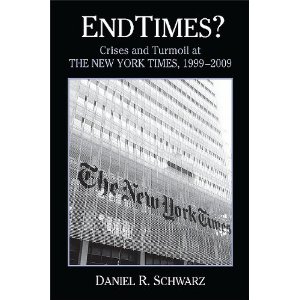 From
Jayson Blair, Howell Raines, Judith Miller and WMDs to growing competition from online and twenty-four-hour
cable news, the first decade of the twenty-first century was not particularly kind to the New York Times. In
this groundbreaking study of the recent life and times of America's most important newspaper, Daniel R. Schwarz
describes the transformation of the Times as it has confronted not only its various scandals and embarrassments
but also the rapid rise of the internet and blogosphere, the ensuing decline in circulation and print
advertising, and the change in what contemporary readers want and how they want to get it.
From
Jayson Blair, Howell Raines, Judith Miller and WMDs to growing competition from online and twenty-four-hour
cable news, the first decade of the twenty-first century was not particularly kind to the New York Times. In
this groundbreaking study of the recent life and times of America's most important newspaper, Daniel R. Schwarz
describes the transformation of the Times as it has confronted not only its various scandals and embarrassments
but also the rapid rise of the internet and blogosphere, the ensuing decline in circulation and print
advertising, and the change in what contemporary readers want and how they want to get it.
Drawing on one-on-one interviews with past and present editors, including every living executive editor, as well as the publisher, Schwarz discusses virtually every aspect of the contemporary Times, from columnists to cultural coverage. He explains how, in response to continuous online updating and twenty-four-hour all-news radio and television, the Times has become much more like a daily magazine than a traditional newspaper, with increased analysis (as opposed to reporting) of the news as well as value-added features on health, travel, investing, and food. After carefully tracing the rise of the Times's website, Schwarz asks whether the Times can survive as a print newspaper, whether it can find a business model to support its vast print and online newsgathering operation, and whether the Sulzberger family can survive as controlling owners.
He also asks whether the Times, in its desperate effort to survive, has abandoned its quality standards by publishing what he calls "Timeslite" and "Timestrash." Writing as a skeptical outsider and devoted lifelong reader, Schwarz ironically concludes that the Times is the worst newspaper in the world, except for all the others. Endtimes? is a must-read for Times readers as well as anyone interested in the radical change in print and broadcast media in the rapidly evolving Internet Age.
In 2014, the new paperback edition of Endtimes? Crisis and Turmoil at the New York Times appeared with a Preface bringing it up to date, some fine-tuning, and a slightly different title.
He also asks whether the Times, in its desperate effort to survive, has abandoned its quality standards by publishing what he calls “Timeslite” and “Timestrash.” Writing as a skeptical outsider and devoted lifelong reader, Schwarz ironically concludes that the Times is the worst newspaper in the world, except for all the others. Endtimes? is a must-read for Times readers as well as anyone interested in the radical change in print and broadcast media in the rapidly evolving Internet Age.
See excerpts from reviews of Endtimes? Crises and Turmoil at the New York Times, 1999-2009
Listen to a podcast interview (item #18) from May 7, 2012 about Endtimes? Crisis and Turmoil at the New York Times, 1999-2009 below (Skip to 7:45 for the interview)
Click here to see a recorded interview with Cornell University. (Youtube link)
Listen to an Interview with Bill Jaker on WSKG-FM (Binghamton), June 26, 2012.
After the publication of Endtimes, I wrote a series of blogs for the Huffington Post.
Buy Endtimes? from Barnes and Noble
Kindle and Nook editions available
"The History
and Future of the New York Times," C-Span, Dec. 28, 2012 and Jan. 2, 2013:
an hour plus film of my Nov. 28, 2012 talk on Endtimes? Crises and Turmoil at the New York Times, 1999-2000
at the Museum of the City of New York
Interview and Discussion, "Trump and the Media," with Lee Rayburn, WHCU, Ithaca, Oct. 28, 2016. Podcast: http://whcuradio.com/morning-newswatch/trump-the-media/
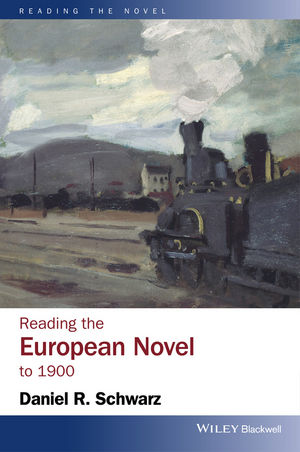
Reading the European Novel to 1900
Description
- Offers a close reading of individual texts with attention to their cultural and canonical context
- Examines the history and evolution of the novel to 1900 and defines each author’s aesthetic, cultural, political, and historical significance
- Covers essential and frequently taught masterworks up to 1900, including Cervantes’ Don Quixote; Tolstoy’s War and Peace and Anna Karenina; Dostoevsky’sNotes from Underground,Crime and Punishment, and The Brothers Karamazov; Stendhal’sThe Red and the Black anThe Charterhouse of Parma; Flaubert’Madame BovaryandSentimental Education; Balzac’s Pere Goriot; and Zola’sGerminal
- Written with students and teachers in mind, this book provides accessible and engaging discussions of each novel, along with important pedagogical tools
Table of Contents
Acknowledgments ix
1 Introduction: The Odyssey of Reading Novels 1
2 MigueldeCervantes’Don Quixote (1605, 1615): Inventing the Novel 25
3 Reading Stendhal’s The Red and the Black (1830) and The Charterhouse of Parma (1839): Character and Caricature 55
A. “Perhaps”:The Red and the Black as Psychological Novel and Political Anatomy 56
B. The Charterhouse of Parma: Narrative as Energy, Reading as Play 69
4 PredatoryBehaviorinBalzac’sP`ere Goriot (1835): Paris as a Trope for Moral Cannibalism 89
5 Flaubert’sMadame Bovary (1857) and Sentimental Education (1869): The Aesthetic Novel 107
A. Madame Bovary: Literary Form Examining Provincial Manners and Desire 107
B. Briefly Discussing the Puzzles of Sentimental Education 124
6 ReadingDostoevsky’sNotes from Underground (1864) and Crime and Punishment (1866) 133
A. Notes from Underground: The Piano Plays Back 133
B. Crime and Punishment: Raskolnikov’s Descent and Rebirth 146
7 Hyperbole and Incongruity in Dostoevsky’s The Brothers Karamazov (1880): Excess and Turmoil as Modes of Being 171
8 Tolstoy’sWar and Peace (1869): The Novel as Historical Epic 203
9 Tolstoy’sAnna Karenina (1877): Exploring Passions and Values in Nineteenth-Century Russia 231
10 Emile Zola’s Germinal (1885): The Aesthetics, Thematics, and Ideology of the Novel of Purpose 253
Selected Bibliography (IncludingWorks Cited) 273
Index 279
Author Information
Daniel R. Schwarz is Frederic J. Whiton Professor of English Literature and Stephen H. Weiss Presidential Fellow at Cornell University, where he has taught since 1968. He is regarded as among the world’s leading critic-scholars of the form, history, and meaning of the novel.He has written sixteen books covering a wide variety of subjects from renowned studies of Joseph Conrad, James Joyce, Wallace Stevens, and critical theory as well as the Holocaust and New York City culture. Most recently, he is the author of Crises and Turmoil at the New York Times,(2012; new paperback edition, 2014), In Defense of Reading: Teaching Literature in the Twenty-First Century (Wiley-Blackwell, 2008), and Reading the Modern British and Irish Novel 1890-1930(Blackwell, 2004). He blogs regularly on the media and higher education for the Huffington Post and has lectured all over the world.
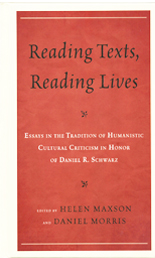 Festschrift in my honor, Reading Texts, Reading Lives: Essays in the
Tradition of Humanistic Cultural Criticism in Honor of Daniel R. Schwarz, eds. Helen Maxson and Dan
Morris: co-published by Rowman and Littlefield (UK) and Newark, Delaware: University of Delaware Press, 2012.
Festschrift in my honor, Reading Texts, Reading Lives: Essays in the
Tradition of Humanistic Cultural Criticism in Honor of Daniel R. Schwarz, eds. Helen Maxson and Dan
Morris: co-published by Rowman and Littlefield (UK) and Newark, Delaware: University of Delaware Press, 2012.
In addition to an introduction that speaks with great generosity about my influence and also includes as the final chapter a lengthy interview about my work and career, the volume has an annotated bibliography of my work.
Dan Morris Interview for Festschrift in honor of Daniel Schwarz
Cornell Chronicle article on Festschrift
From the back cover:
"Our culture attempts to separate competing ideological factions by denying relationships between multiple perspectives and influences outside one's own narrow interpretive community, The distinguished contributors to this volume find Daniel R. Schwarz's pluralistic self-questioning approach to what he calls "'reading texts and reading lives' quite relevant to the current historical moment and political situation. A legendary scholar of modernist literature, Schwarz's critical principles are a healthy corrective to cultural hubris.
The contributors treat works ranging from fictions by Joyce, Conrad, Lawrence, Morrison, and Woolf to the poetry of Yeats, Holocaust literature, the environmental writings of Wendell Berry and the photographs of Lee Friedlander. These authors focus on a different works, but they follow Schwarz in stressing formal elements most often associated with traditional realism while keeping an eye on historical and author-centered approaches. The contributors also follow Schwarz in their emphasis on narrative cohesion and in how they look for signs of agency among characters who possess the will to alter their fate, even in a seemingly random universe such as one depicted by Conrad. Schwarz encourages a values-centered approach that leaves room for the reader to address the ways in which reading a text correlates to the reader's ability to find meaning and value in experience outside the text. Like Schwarz, the contributors look for intentionality of authorial meaning (rather than something called an 'author function') as well as for the relationship between lived experience and the imagined world of the literary work (rather than the endless semiotic play of an ultimately indecipherable text)"
Table of Contents:
Introduction by Daniel Morris
Paul Gordon: “Approaching Angels: The Case for The Case for a Humanistic Poetics.”
Helen F. Maxson: “The Pluralistic Humanism Wendell Berry.”
Ruth Hoberman: “The Three-Way Conversation of Gilbert Cannan, Mark Gertler, and D.H. Lawrence.”
Ross Murfin: “Of Temples, Prisons, Umbrellas, and Revolutionaries: Culture, Consciousness, and Poetry in D.H. Lawrence.”
Brian May: “Yeats’s Modernism in Time of Civil War.”
Margot Norris: “Female Transmigration in James Joyce’s ‘Eveline’ and Nella Larson’s Quicksand.”
Ed O’Shea: “From Joyce to Toibin: Postmodern Dublin in Mothers and Sons.”
Steve Sicari: “Repetition in Modern Fiction: From Paralysis to Hope.”
Beth Newman: “Humanism Under Erasure: Identity and Nation in Joyce’s Ulysses.”
Joseph Heininger: “Michael O’Siadhail’s Inscriptions of Holocaust Survivors’ Writings in The Gossamer Wall: “A summons to try to look, to try to see.”
Daniel Morris: Historical Memorialization and Personal Memory in Lee Friedlander’s Self-Portrait and American Monument.”
Holly Stave: “In a Mirror Dimly:The Limitations of Love in Toni Morrison’s Love.”
Daniel R. Schwarz in conversation with Daniel Morris
Brian W. Shaffer: “A Bibliography of Major Works by Daniel R. Schwarz.”
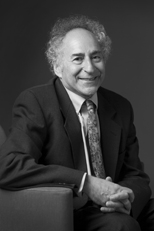
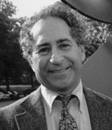
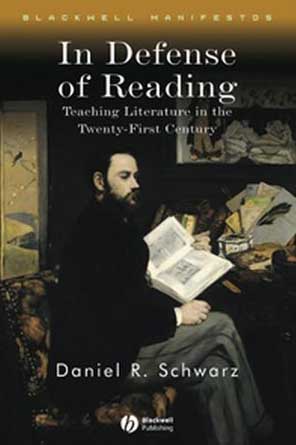 The book
jacket reads: "What happens when we read imaginative literature? What do we learn from reading such texts?
Reading complements our experience, sharpens our perceptions, gives us insight into how other humans live, enables
us to understand other cultures and periods, and gives us aesthetic pleasure. In Defense of Reading: Teaching
Literature in the Twenty-First Century is a passionate and beautifully written defense of the pleasures of
reading. With clarity and eloquence, the author--influential literary critic and award-winning literary critic
Daniel Schwarz--shares his insights on why we read, how we read, and what transpires when we undertake what he
calls 'the odyssey of reading.'"
The book
jacket reads: "What happens when we read imaginative literature? What do we learn from reading such texts?
Reading complements our experience, sharpens our perceptions, gives us insight into how other humans live, enables
us to understand other cultures and periods, and gives us aesthetic pleasure. In Defense of Reading: Teaching
Literature in the Twenty-First Century is a passionate and beautifully written defense of the pleasures of
reading. With clarity and eloquence, the author--influential literary critic and award-winning literary critic
Daniel Schwarz--shares his insights on why we read, how we read, and what transpires when we undertake what he
calls 'the odyssey of reading.'"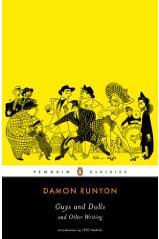 The book jacket reads: "Damon Runyon grew up in the West, moved to New York City, and became one of the
leading voices of American popular culture, from sports writing to short fiction, this unique collecion offers an
eclectic sampling of his extradordinary talent. Here are newspaper pieces, stories--including the last one he ever
composed--poetry, and, of course, the Broadway tales for which he is chiefly remembered: Guys and Dolls,
Blood Pressure, The Bloodhounds of Broadway, and others. Featuring works that are impossible to find
elsewhere, and Runyon's signature eye for detail--particularly the sounds, smells, and tastes of New York--this
book brings an American icon to a new generation of readers.
The book jacket reads: "Damon Runyon grew up in the West, moved to New York City, and became one of the
leading voices of American popular culture, from sports writing to short fiction, this unique collecion offers an
eclectic sampling of his extradordinary talent. Here are newspaper pieces, stories--including the last one he ever
composed--poetry, and, of course, the Broadway tales for which he is chiefly remembered: Guys and Dolls,
Blood Pressure, The Bloodhounds of Broadway, and others. Featuring works that are impossible to find
elsewhere, and Runyon's signature eye for detail--particularly the sounds, smells, and tastes of New York--this
book brings an American icon to a new generation of readers.
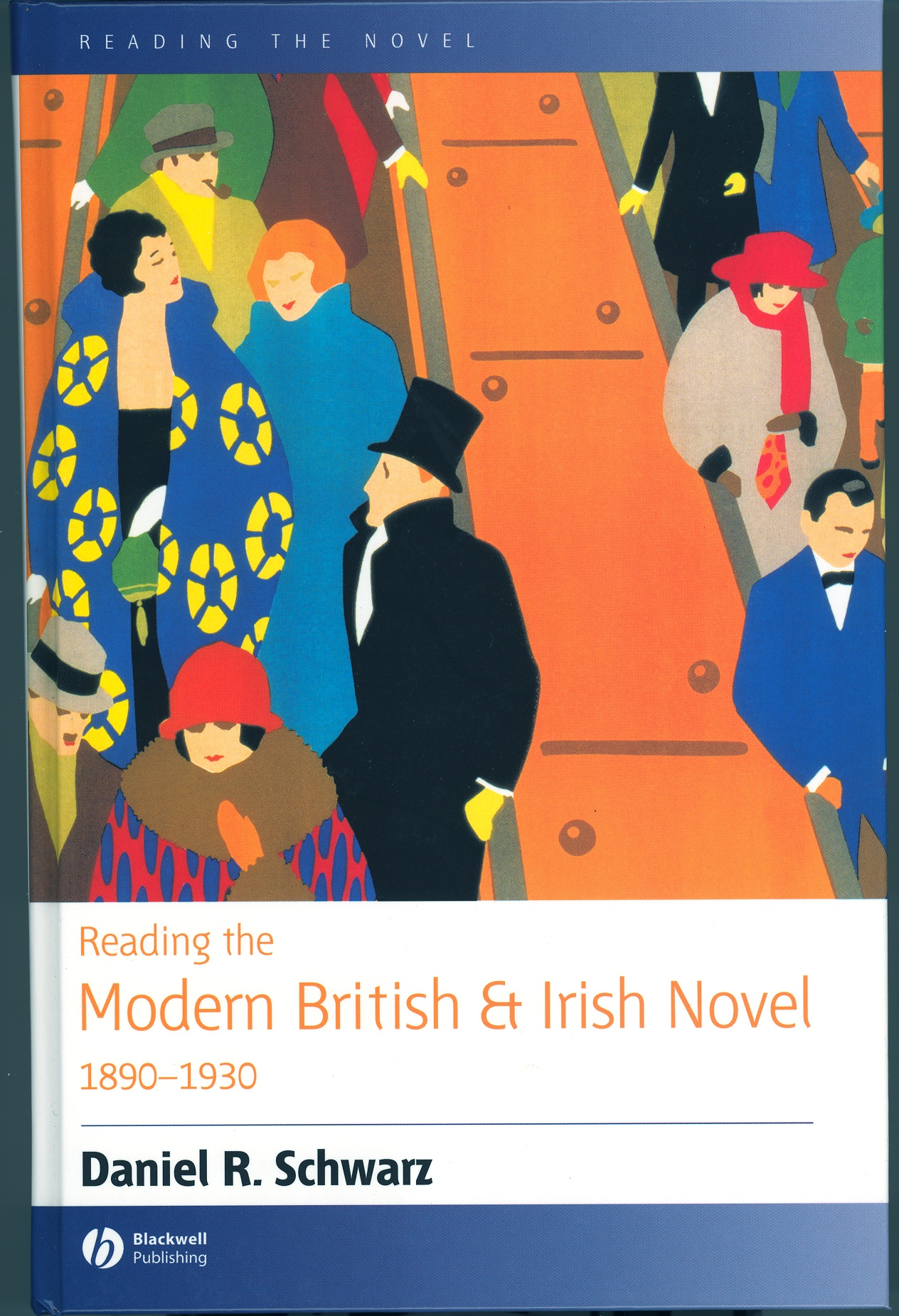 The
book jacket reads: "Daniel R. Schwarz has studied and taught the modern British novel for decades and now
brings his impressive erudition and critical acuity to bear in this insightful study of the major authors and
novels from 1890-1930.
The
book jacket reads: "Daniel R. Schwarz has studied and taught the modern British novel for decades and now
brings his impressive erudition and critical acuity to bear in this insightful study of the major authors and
novels from 1890-1930.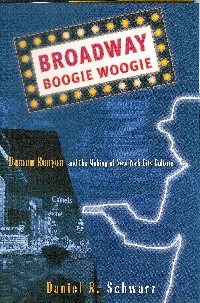 The book jacket reads: "Damon Runyon's popularity and
importance in shaping American culture during the first half
of the twentieth century can hardly be exaggerated. In lively
and exuberant chapters that include a panoramic cultural view
of New York City between the World Wars--with an emphasis on
the city's colorful nightlife--Daniel R. Schwarz examines virtually
every facet of Runyon's career, from sports writer, daily columnist,
trial reporter, and Hollywood figure to the author of the still
widely read short stories that were the source of the Broadway
hit Guys and Dolls.
The book jacket reads: "Damon Runyon's popularity and
importance in shaping American culture during the first half
of the twentieth century can hardly be exaggerated. In lively
and exuberant chapters that include a panoramic cultural view
of New York City between the World Wars--with an emphasis on
the city's colorful nightlife--Daniel R. Schwarz examines virtually
every facet of Runyon's career, from sports writer, daily columnist,
trial reporter, and Hollywood figure to the author of the still
widely read short stories that were the source of the Broadway
hit Guys and Dolls.